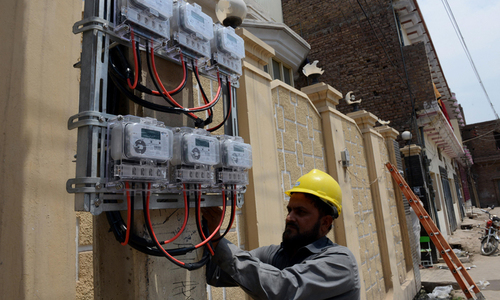FRESH challenges are rearing their heads at the outset of 2020-21 even though the fiscal year should have begun with a clean slate to clear the policy backlog crucial to revive the International Monetary Fund (IMF) programme.
At this stage, the country can ill-afford the derailment of the Fund programme that has been on a pause for a couple of quarters because of work-in-progress initially and then the Covid-19 fallout.
Last week, Prime Minister Imran Khan intervened at the eleventh hour to tinker with an average increase of Rs2.39 per unit in the power tariff for K-Electric determined by the regulator and approved by the Economic Coordination Committee (ECC) of the cabinet to bring Karachi’s tariff on a par with the rest of the country.
The prime minister has taken a long time to be convinced that the power sector’s problems pose the biggest challenge to the economy. A lot of tough and simultaneous decisions have to be made with regard to the power distribution segment and loss-making generation companies
The ECC had twice concluded that the KE power tariff was significantly lower than that of other distribution companies. It meant consumers from the rest of the country were indirectly subsidising electricity users in Karachi. The determination was originally made by the National Electric Power Regulatory Authority (Nepra) in December 2019 for a Rs4.88 per unit (Rs106 billion) increase in the tariff for the 11-quarter adjustment for the period ending March 2019. The delayed determination was caused by KE stay orders.
The ECC decided in March this year that such a big and sudden shock was not advisable. It allowed an increase of Rs2.39 per unit to match the uniform national tariff in the first phase and that too with a two-month gap owing to Covid-19. On July 3, the ECC reiterated its decision, which had to be ratified by the cabinet.
Read: The tangled knot of the power sector
The political noise in the cabinet overruled the economic decision: how could this bad news be delivered to Karachi in the middle of massive loadshedding? The prime minister’s decision has a fiscal cost that will become known once its implementation begins. It will likely be in the range of Rs26bn and Rs71bn. The prime minister ordered that the increase should take place gradually. Its nitty-gritty details have yet to be figured out. The total allocation for the tariff subsidy for Karachi consumers in the current fiscal year is about Rs26bn as opposed to Rs60bn for 2019-20.
Such a decision has to be accompanied by more money. This also comes along conspiracy theories about political friendship between top government functionaries and the sponsors of K-Electric as well as the bilateral relationship with China given the possible takeover of K-Electric by Shanghai Electric.
Decision-making on economic matters at the national level is equally difficult. Within the first week of the new fiscal year, the need for a subsidy on wheat is looming large.
The political noise will only grow with time as the government exhausts its political capital even before major reform decisions are taken. For example, the PTI government has earned the ire of the public over the increase in electricity, gas and petroleum prices. Yet it has not been able to ensure simultaneous reforms to avoid a repeat of more tariff shocks. In the process, it only added more noise with a logjam with independent power producers (IPPs).
The prime minister has taken much longer to be convinced that the power sector’s problems pose the biggest challenge to the economy and a lot of tough and simultaneous decisions have to be made vis-a-vis the distribution sector, loss-making generation companies and the rationalisation of subsidies to make them more transparent and targeted.
That has led the government to a point that it is now struggling with the revival of the IMF programme. Slippages on the revenue front in 2019-20 despite a tight expenditure control were blamed on the unexpected natural calamity of coronavirus. The economic team may tactically like to book maximum money in the last year’s fiscal deficit even if it gets closer to double digits as it did last year with advance borrowing from the central back for the so-called fiscal buffer.
In fact, this may be advisable to stick to the budget deficit limit of 7.2 per cent or 7.5pc for the current year to begin a fresh constructive engagement with the IMF. But then the government will have to address big-ticket items while delivering on low-hanging fruits like changing laws relating to the central bank’s power and functions.
The big-ticket items where the government has struggled to even take the first tiny step are the make-and-break issues not only for the IMF programme but also the future direction of the economy and its people. Work on revenue reforms has still not started. The circular debt in power and gas sectors still persists. Restructuring public-sector entities, particularly those in the energy sector, rising pension bill, introduction of transparency in subsidy for agricultural tube wells and subsidy restructuring are some of the other key issues.
The Fund has become all the more critical to Pakistan at this stage when it needs to keep rolling over international obligations for some years while putting its house in order. The time for reform is getting out of hand.
Published in Dawn, The Business and Finance Weekly, July 20th, 2020














































